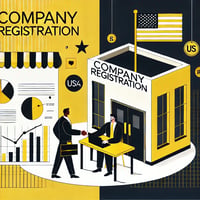
Steps to Set Up a Company:
United States
Choose a Business Structure
- Sole Proprietorship: Single owner, full liability.
- Partnership: Two or more partners, shared liability.
- General Partnership (GP): Equal responsibility and liability among partners.
- Limited Partnership (LP): One general partner with unlimited liability and other limited partners with liability up to their investment.
- Limited Liability Company (LLC): Separate legal entity, limited liability for owners.
- Corporation: Separate legal entity, limited liability, more complex structure.
- C Corporation: Subject to double taxation (corporate and personal level).
- S Corporation: Pass-through taxation, limited to 100 shareholders.
- Non-Profit Organization: Operates for charitable, educational, religious, or scientific purposes, eligible for tax-exempt status.
Open a U.S. Bank Account
- Set Up a Business Bank Account: Necessary for managing business finances.
Obtain Necessary Licenses and Permits
- Federal, State, and Local Licenses: Depending on the nature of your business, you may need specific licenses or permits at different government levels.
Apply for an Employer Identification Number (EIN)
- EIN from the IRS: Necessary for tax purposes, hiring employees, and opening a business bank account.
Employment Law
- Fair Labor Standards Act (FLSA): Governs minimum wage, overtime, and child labour.
- Occupational Safety and Health Act (OSHA): Sets health and safety standards for workplaces.
- Employee Retirement Income Security Act (ERISA): Regulates employee benefit plans.
Register Your Company
- Choose a Company Name: Ensure it is unique and follows naming regulations in your state.
- Register Your Business Name: Depending on your business structure and state requirements, this may involve registering a 'Doing Business As' (DBA) name.
- Draft Articles of Organization/Incorporation: Required for LLCs and corporations, outlining the company’s structure and rules.
- File with the Secretary of State: Submit the articles of organization/incorporation in the state where you are establishing the business.
Comply with Employment Laws
- Employment Contracts: Draft contracts that comply with federal and state labor laws.
- Register for State and Local Taxes: Ensure compliance with state and local tax obligations.
- Adhere to Health and Safety Regulations: Follow OSHA guidelines and state-specific regulations.
Accounting and Reporting
- Set Up an Accounting System: Maintain accurate financial records.
- Prepare and File Annual Reports: Required by most states for corporations and LLCs.
- File Federal and State Tax Returns: Submit annual tax returns to the IRS and state tax authorities.
Laws and Regulations to Consider
Corporate Law
- State Business Laws: Vary by state, governing the formation and operation of companies.
- Federal Regulations: This may apply depending on the industry and business activities.
Tax Law
- Federal Income Tax: Administered by the IRS.
- State Income Tax: Varies by state.
- Sales Tax: Collected at the state and local levels.
Data Protection Law
- General Data Protection Regulation (GDPR): For businesses handling data of EU citizens.
- State-Specific Data Privacy Laws: Such as the California Consumer Privacy Act (CCPA).
Environmental Law
- Environmental Protection Agency (EPA) Regulations: Governs environmental protection and sustainability practices.
Intellectual Property Law
- Trademark Law: Governed by the USPTO.
- Patent Law: Governed by the USPTO.
When to Consider Setting Up a Company in the United States:
- Large Consumer Market: The U.S. has one of the largest and most diverse consumer markets in the world.
- Business-Friendly Environment: The U.S. provides a favorable business climate with a robust legal framework and support for entrepreneurship.
- Access to Capital: The U.S. offers numerous opportunities for funding through venture capital, angel investors, and financial institutions.
- Innovation and Technology Hub: The U.S. is a global leader in innovation, technology, and research and development.
- Skilled Workforce: Access to a highly skilled and educated workforce, particularly in technology, finance, and healthcare sectors.
- Strong Infrastructure: Advanced infrastructure supporting transportation, logistics, and digital connectivity.
- Global Trade Opportunities: Extensive trade agreements and a strong position in international trade.
By considering these factors and aligning them with your business goals, you can determine if setting up a company in the United States is the right move for your organization. Consulting with local experts and advisors can further help in making an informed decision.

Step-by-Step Guide: How to set up a Company
Setting up a company involves a series of crucial steps that require careful planning and execution. From choosing the right business structure to understanding legal and tax obligations, each stage is vital to the successful launch and operation of your business. This step-by-step guide provides a comprehensive overview of the key processes involved in establishing a company, ensuring you have the knowledge and tools needed to navigate the complexities of business formation.
